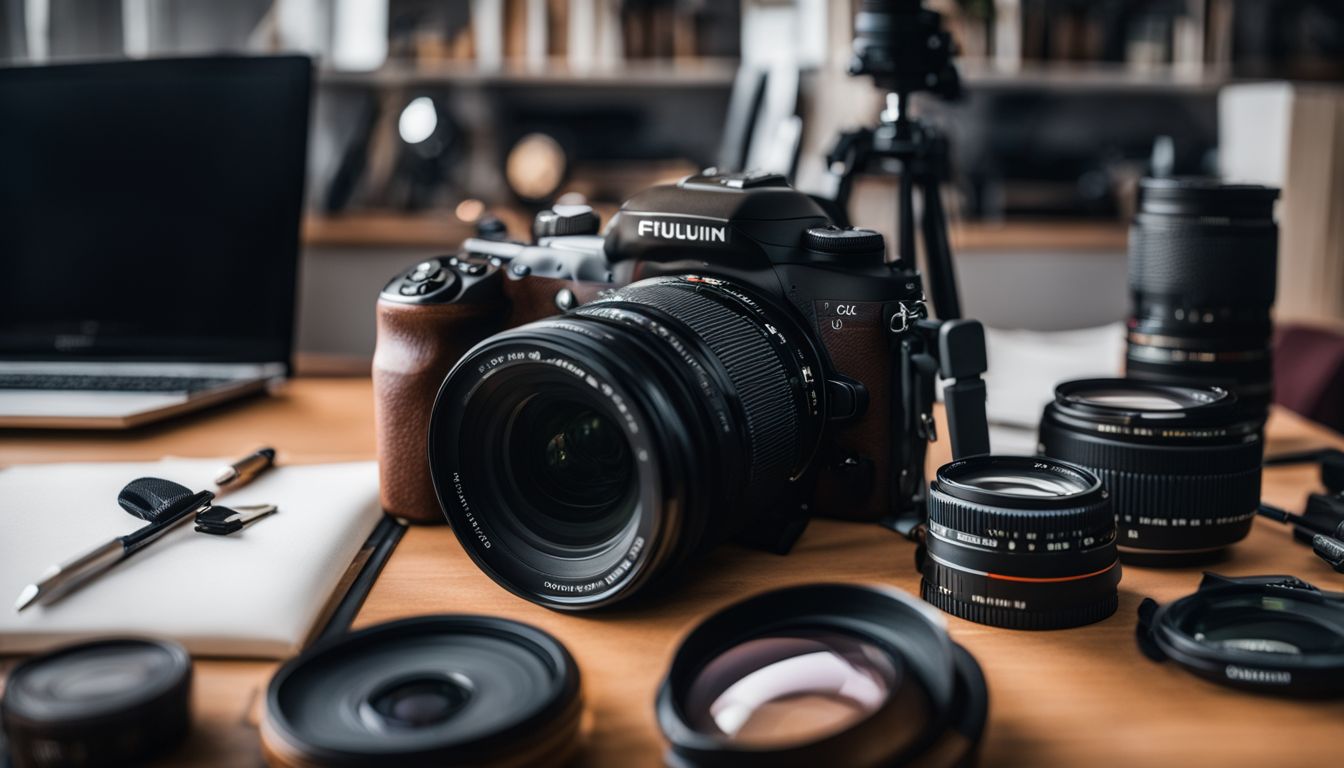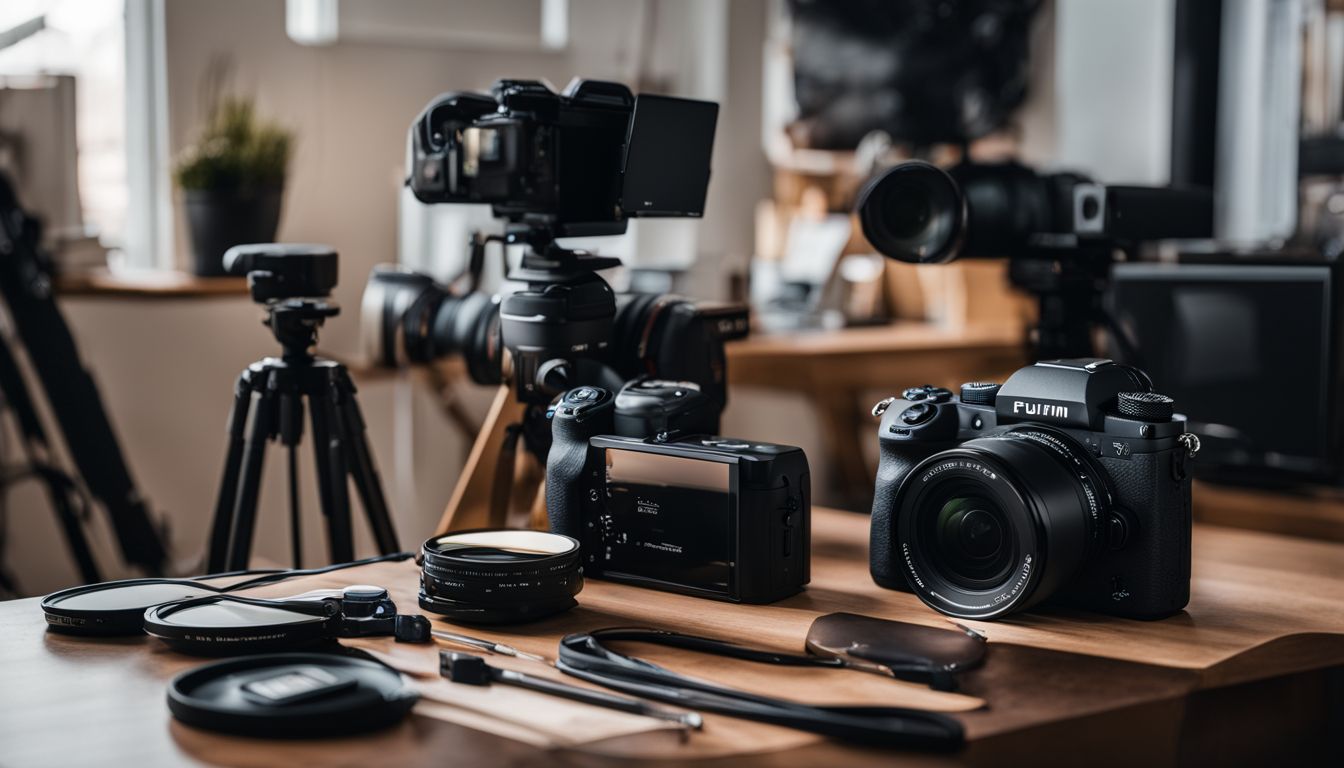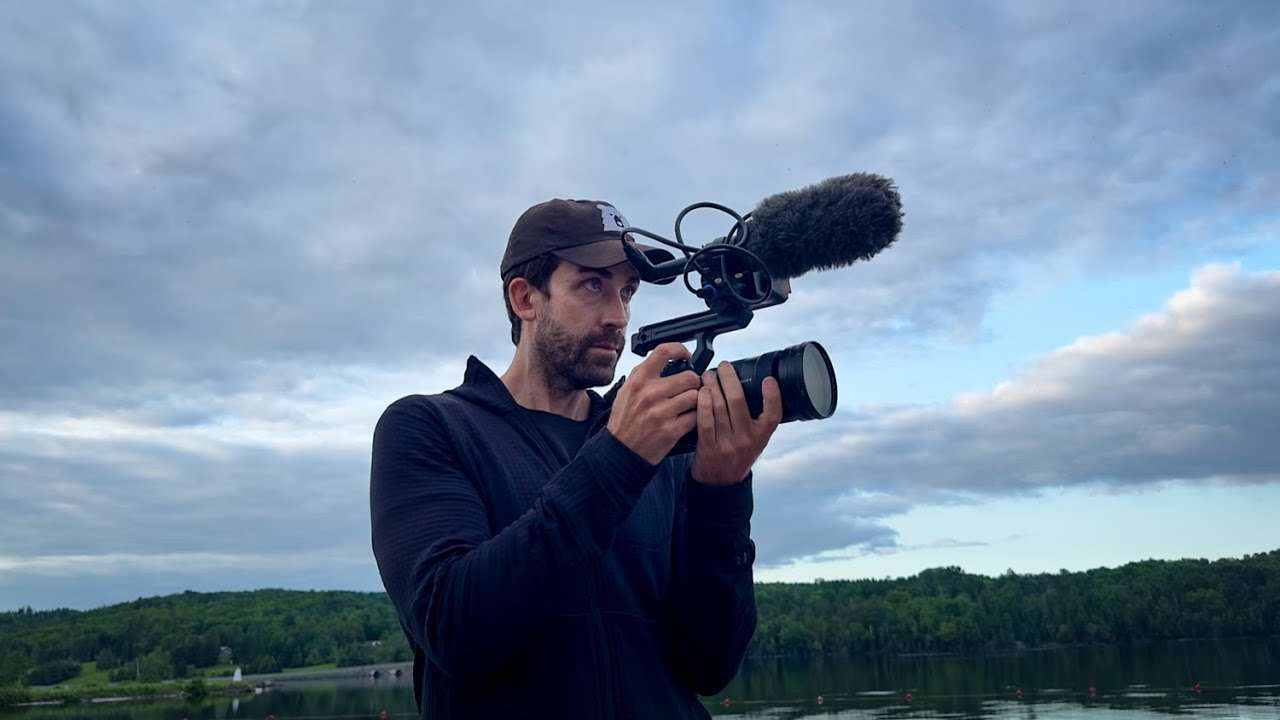Videography in photography has several roles. These include:
- Shooting high-definition videos: This is a crucial part of a videographer’s job.
- Editing videos: The videographer must make the videos presentable for clients.
- Working on commission: Videographers often capture images and videos to tell a story or document an event.
- Understanding camera equipment: A good videographer knows how all their gear works.
- Learning about lighting techniques: Good lighting can make or break a video, so this is key.
- Recording audio: Sound is just as important as the visuals in any video project.
- Keeping up with trends: Industry trends change often, so it’s important to stay updated.
- Improving skills and knowledge: Dedication and willingness to improve are necessary for success in this field.
- Special training programs or courses can help enhance these skills.
What are the day to day duties of a videographer?

Videographers have a lot of work to do every day. Here are the main tasks:
- They plan their shoots.
- Videographers choose and set up equipment.
- They record videos at events or places.
- Videographers check that they have high – quality sound and images.
- They sort and tidy up their video clips.
- Videographers need to edit their clips to make full videos.
- They use computer programs to add effects and music.
- Videographers show clients the finished videos and fix anything they don’t like.
- At the end of the day, they clean their equipment and put it away safely.
What skills should a videographer have?

A videographer needs a set of key skills to create high-quality videos.
- First, they need a strong skill in photography.
- They must also have a good understanding of camera equipment.
- Lighting techniques are important as well.
- Audio recording is also an area where skills are needed.
- Editing proficiency is a must for any videographer.
- The ability to be creative helps them make unique videos.
- They need to keep learning about new tools and ways of making videos.
- A videographer should be physically fit as the job can require holding heavy cameras for long times.
- They need to work hard and keep on improving their skills with every video they make.
- Lastly, getting some special training can help them to know new things about their job and do better at it.
What type of personality does a videographer have?
A videographer needs to be creative. They must think of fresh ideas for each video they make. A videographer also has to show hard work and care in their job. This lets them shoot and edit high-definition videos that people love.
They should be ready to learn new things all the time too. New ways of shooting videos come up often. So, a videographer who is open to learning will do better at their job.
A videographer should also have good people skills. It’s very helpful when they need to work with different folks on a project or event. Being nice and easy-going helps them get along well with others.
Finally, staying cool under stress is important for a videographer’s personality as well. Things might not go as planned during shoots sometimes but it’s key that the person behind the camera stays calm and handles issues well.
What is your greatest strength as a videographer?
My biggest strength as a videographer is making top-notch videos people love. I have the right skills to shoot and edit videos well. My work stands out because of my creative eye and feel for the perfect shot.
I also know about camera equipment, lighting tricks, and sound recording very well. This helps me make better movies that look good and sound clear too. I keep learning new ways to get better at my job every day.
It makes sure that my skills stay fresh and up-to-date with the latest trends.
What are the requirements for a videographer?
Being a videographer asks for a set of skills and things. Here is what someone needs to become a videographer:
- A keen eye: They need to see the world much like a camera does.
- Editing skill: This is how they make the video look good after it has been shot.
- Physical strength: A lot of time is spent on their feet, moving around with heavy gear.
- Schooling: Though not always needed, having education in film or media can help.
- Experience: Starting small, like shooting weddings or school events, can help build up a portfolio.
- Creativity: They should be able to make any event look more special than it already is.
- Good understanding of camera equipment: Knowing what each piece of gear does will help them do their job better.
- Knowledge of lighting techniques: So that everything looks clear and bright in the video.
- Training in audio recording: To make sure every sound and word are caught on tape.
What equipment do I need to start making videos?
To start making videos, you need the right tools. Here is the basic kit:
- A good quality video camera: Your first tool as a videographer.
- Tripod: Keeps your shots steady and level.
- Lighting equipment: Helps to create the perfect mood and effect.
- Microphone: Captures clear audio for your videos.
- Video editing software: Allows you to piece together and polish your footage.
- Laptop or computer: Needed for editing your videos.
- Memory cards or hard drives: For storing all of your footage.
- Extra batteries and charger: Ensures you never run out of power mid-shoot.
- Bag or case: Protects your gear during transport.
What equipment do you need to make high-quality videos?
To make high-quality videos, you need the right equipment. Here is a list:
- A good camera is key. More expensive ones can give better results.
- Tripods help keep shots steady.
- Good lighting makes sure your video looks clear and bright.
- Microphones capture sound clearly without noise.
- Extra batteries mean you can shoot for longer.
- Memory cards store your videos till you can move them to a computer.
- Lens filters change how light enters the camera in ways that can improve your video.
- You also need a bag to carry everything around safely.
What do you call a person who edits videos?
A person who edits videos is called a video editor. Video editors are responsible for taking raw footage and transforming it into a polished and cohesive final product. They use specialized software to trim, rearrange, and enhance footage, add special effects or graphics, adjust colors and audio levels, and ensure that the video flows smoothly.
Video editors play a crucial role in bringing stories to life through their creative editing techniques. They collaborate closely with videographers to understand their vision and create videos that effectively communicate the desired message.
A skilled video editor can make all the difference in creating visually stunning and engaging videos for various purposes such as films, commercials, documentaries, social media content, or corporate videos.
What is a videography skill?
A videography skill refers to the abilities and knowledge required to shoot and edit videos professionally. It includes expertise in operating cameras, understanding lighting techniques, capturing quality audio, and using editing software effectively.
A skilled videographer knows how to create compelling visual stories by choosing the right angles, composing shots creatively, and selecting suitable transitions during editing. They also have a strong creative vision and can adapt their skills to various genres of videography such as events, weddings, documentaries, or promotional videos.
By continually improving their technical skills and staying updated with industry trends, videographers can provide high-quality content that meets clients’ expectations.
How can I be successful in videography?
To be successful in videography, you can follow these steps:
- Develop a strong foundation: Learn the technical aspects of videography, such as camera settings, lighting techniques, and composition.
- Practice regularly: Take every opportunity to shoot videos and experiment with different styles and subjects. This will help you improve your skills and develop your own unique style.
- Learn video editing: Master the art of video editing using software like Adobe Premiere Pro or Final Cut Pro. Editing is crucial in creating a compelling final product.
- Stay updated with technology: Keep up with the latest trends and advancements in videography equipment and software to ensure your work stays current and competitive.
- Build a portfolio: Create a portfolio showcasing your best work to impress potential clients or employers. Highlight a variety of projects that demonstrate your versatility as a videographer.
- Network within the industry: Attend industry events, join professional organizations, and connect with other videographers and filmmakers. Building relationships can lead to job opportunities or collaborations.
- Market yourself effectively: Develop a strong online presence by creating a website or social media profiles dedicated to showcasing your work. Use SEO strategies to make it easier for clients to find you.
- Deliver exceptional customer service: Provide excellent communication, meet deadlines, and go above and beyond to meet client expectations. Satisfied clients will recommend you to others and help grow your business.
How do I promote myself as a videographer?
To promote yourself as a videographer, you can:
- Create an online portfolio showcasing your best work.
- Use social media platforms like Instagram and YouTube to share your videos and engage with potential clients.
- Attend networking events and industry conferences to connect with other professionals in the field.
- Collaborate with other creatives, such as photographers or graphic designers, to expand your network and reach.
- Offer discounted or pro bono services for non – profit organizations or local businesses to build your portfolio.
- Ask satisfied clients for testimonials or referrals that you can showcase on your website or social media pages.
- Utilize SEO strategies to improve your visibility in online searches for videographers in your area.
- Advertise your services through local newspapers, community boards, or online classifieds.
- Participate in video contests or submit your work to film festivals to gain exposure and recognition.
- Keep honing your skills and staying up-to-date with the latest trends and techniques in videography.
How do you shoot good videos on your phone?
To shoot good videos on your phone, follow these tips:
- Hold your phone steady to avoid shaky footage.
- Use natural light whenever possible for better video quality.
- Make sure your subject is well – lit and in focus.
- Avoid zooming in too much, as it can decrease the video quality.
- Shoot from different angles to add variety to your videos.
- Keep the background simple and uncluttered to avoid distractions.
- Experiment with different shooting modes and settings on your phone’s camera app.
- Use a tripod or stabilizer if you need extra stability for your shots.
- Don’t forget to clean the lens of your phone regularly for clear and sharp images.
- Practice framing your shots and capturing interesting moments.
How do I take high-quality photos and videos?
To take high-quality photos and videos, follow these tips:
- Use a good quality camera or smartphone with high – resolution capabilities.
- Ensure proper lighting by shooting in well-lit areas or using artificial lighting setups.
- Keep the camera steady to avoid blur by using a tripod or stabilizer.
- Experiment with different angles and perspectives to add interest to your shots.
- Frame your subjects carefully, considering composition and balance.
- Pay attention to focus and make sure your subjects are sharp and clear.
- Adjust settings like aperture, shutter speed, and ISO according to the conditions for optimal results.
- Capture moments naturally by letting people act casually instead of posing stiffly.
- Use editing software or apps to enhance color, contrast, and overall quality if needed.
How do I take a video with my Android phone?
To take a video with your Android phone, follow these steps:
- Open the camera app on your Android phone.
- Switch to video mode by tapping on the video icon or selecting the video option from the settings menu.
- Hold your phone in landscape mode for a wider and more cinematic frame.
- Use both hands to keep the phone steady and minimize shaky footage.
- Tap on the record button to start recording the video.
- Keep an eye on the timer or indicator to track the length of your video.
- Make sure to focus on your subject by tapping on it before recording.
- Experiment with different angles, zoom levels, and composition for more interesting shots.
- Utilize natural lighting whenever possible for better image quality.
- Avoid excessive movement or panning too quickly as it can make your video look blurry or disorienting.
- Videography skills encompass photography, editing proficiency, creativity, and physical skills.
- A videographer needs to have a good understanding of camera equipment, lighting techniques, and audio recording.
- Videographers can benefit from specialized training programs or courses to enhance their skills and stay updated with industry trends.
How do I become a successful freelance videographer?
To become a successful freelance videographer, follow these steps:
- Acquire the necessary skills in shooting and editing high – definition videos.
- Develop proficiency in photography, editing techniques, creativity, and physical skills.
- Continuously learn and adapt to new techniques and technology.
- Build a portfolio showcasing your best work to attract clients.
- Network with other professionals in the industry to create opportunities for collaboration.
- Market yourself effectively by creating a website or using social media platforms to showcase your work.
- Offer competitive rates based on factors like experience, location, and industry standards.
- Stay updated with industry trends through specialized training programs or courses.
- Provide excellent customer service to ensure client satisfaction and positive recommendations.
- Continuously improve your skills and knowledge to stay ahead of the competition.
How do I start a freelance videographer?
To start a freelance videographer, you can follow these steps:
- Gain experience: Start by taking on small video projects to build your portfolio and gain practical experience in videography.
- Invest in equipment: Purchase essential videography equipment such as a high-quality camera, tripod, lighting equipment, and audio gear to ensure professional-looking videos.
- Create a portfolio: Compile your best video work into a portfolio that showcases your skills and capabilities as a videographer.
- Build an online presence: Create a website or social media profiles dedicated to your videography services to showcase your work and attract potential clients.
- Network with others in the industry: Attend networking events, join online communities, and collaborate with other professionals to expand your network and increase opportunities for freelance work.
- Market yourself: Promote your services through online platforms, word-of-mouth referrals, and targeted marketing strategies to reach potential clients who may require videography services.
- Set competitive rates: Research market rates for freelance videographers in your area and set competitive pricing for your services based on factors such as experience, complexity of the project, and client budget.
- Establish contracts and agreements: Develop standard contracts or agreements outlining the terms of engagement with clients to ensure clear communication, expectations, and legal protection for both parties involved.
- Provide excellent customer service: Deliver high-quality work within agreed timelines and maintain professionalism throughout the project to foster positive relationships with clients and encourage repeat business or referrals.
- Continuously improve skills: Stay updated with industry trends, learn new techniques through workshops or online courses, and invest time in refining your craft to enhance the quality of your videography services.
What do you call a videographer?
A videographer is someone who captures and edits videos professionally. They are often referred to as video photographers or cinematographers. Their main focus is on shooting high-definition videos of events, using their skills in photography, editing, and creativity to make the videos visually appealing and engaging.
A videographer needs to have a good understanding of camera equipment, lighting techniques, and audio recording to produce high-quality videos. They can work on commission or as freelancers, documenting stories or events through their video recordings.
Becoming a successful videographer requires dedication, continuous learning, and staying updated with industry trends.
What is the role of a videographer in a company?
A videographer plays an important role in a company by capturing and creating high-quality videos for various purposes. This includes:
- Recording and documenting company events, such as conferences, meetings, and presentations.
- Creating promotional videos to advertise products or services.
- Shooting interviews with employees or clients to showcase their experiences or testimonials.
- Producing training videos to educate employees about company policies, procedures, or new technologies.
- Editing and post – production of videos to ensure they are visually appealing and convey the desired message.
- Collaborating with marketing teams to develop video content strategies and ideas.
- Maintaining and organizing video equipment to ensure it is in good working condition.
What is another name for a Videographer?
A videographer is also commonly known as a video producer or cinematographer. These terms are interchangeable and refer to professionals who specialize in shooting and editing videos.
Video producers capture footage of various events, such as weddings, concerts, or corporate functions, and then edit the footage to create a final product that tells a story or conveys a message.
Cinematographers focus more on the artistic aspects of videography, using their skills in camera angles and lighting techniques to create visually stunning videos. Whether they are called videographers, video producers, or cinematographers, these individuals play an important role in capturing moments and creating engaging visual content.
What is a video photographer called?
A video photographer is commonly known as a videographer. They are professionals who specialize in capturing and recording videos of various events, scenes, or subjects. Videographers use high-definition cameras and equipment to shoot footage and then edit it to create a finished product.
Their goal is to make the videos visually appealing and engaging for their clients or viewers. Videographers may work independently or as part of a team, depending on the project requirements.
They have a keen eye for detail and possess technical skills in areas such as lighting, framing, composition, and editing software.
What do you call videography?
Videography is the art and skill of capturing videos and creating visual stories. A person who practices videography is called a videographer. They specialize in shooting and editing high-definition videos for various purposes, such as events, documentaries, or promotional content.
Videographers use their expertise in camera equipment, lighting techniques, and audio recording to create compelling visuals that convey messages effectively. They may also be involved in post-production work, using editing software to enhance the video footage and create a polished final product.
The term “videographer” is often used interchangeably with “video photographer” or “cinematographer.” Overall, videography involves creativity, technical skills, and a keen eye for detail to bring stories to life through motion pictures.
Is videography a hobby?
Videography can be both a hobby and a profession. Many people enjoy capturing videos as a way to express their creativity and document special moments in their lives. As a hobby, videography allows individuals to experiment with different techniques, learn about video editing, and develop their storytelling skills.
It can also provide an opportunity for personal growth and self-expression. However, for some people, videography becomes more than just a hobby and turns into a full-time career. These individuals may pursue professional training, invest in high-quality equipment, and take on paid projects to generate income from their passion for videography.
In summary, while some people engage in videography purely as a hobby for personal enjoyment and creative expression, others choose to turn it into a profession by acquiring the necessary skills and pursuing paid opportunities.
Whether as a hobby or career choice, videography offers endless possibilities for artistic expression and storytelling through the medium of video.
What is cinematic videography?
Cinematic videography is a style of creating videos that aims to evoke emotion and tell a story. It focuses on using techniques like creative camera angles, smooth movements, and effective lighting to create visually stunning footage.
Cinematic videographers often use high-quality equipment and editing software to enhance the overall look and feel of their videos. They pay attention to details such as composition, color grading, and sound design to create a cinematic experience for viewers.
Whether it’s capturing breathtaking landscapes or documenting important events, cinematic videography adds an artistic touch that sets it apart from traditional video recording.
What Are the Essential Skills Needed for Mastering Videography?
Mastering videography requires a variety of essential skills. One should possess a solid understanding of composition, lighting, and camera techniques. Attention to detail and good problem-solving abilities are crucial for overcoming the videography difficulty level. Additionally, proficiency in video editing software and a creative eye are necessary to produce high-quality, captivating videos.
What are the Essential Videography Duties and Skills That I Need to Master?
Understanding videography skills explained is crucial for anyone looking to master the art of videography. Some essential duties include capturing high-quality footage, using proper lighting techniques, and employing various camera movements. Additionally, skills such as video editing, sound design, and storytelling are vital for creating visually captivating videos. By honing these abilities, aspiring videographers can produce professional and compelling content that stands out from the rest.
FAQs
1. What are the essential duties of a videographer?
The essential duties of a videographer include capturing video footage, setting up and operating camera equipment, planning shots and angles, editing videos, and ensuring overall visual quality.
2. What skills do I need to master for videography?
To excel in videography, it is important to have skills in operating cameras and related equipment, framing shots creatively, understanding lighting techniques, editing videos using software tools, and having a good eye for composition.
3. Is formal education necessary to become a videographer?
While formal education can provide valuable knowledge and training in videography techniques, it is not always necessary. Many successful videographers develop their skills through practical experience and self-guided learning.
4. How can I improve my video editing skills?
To enhance your video editing abilities, you can practice using professional software like Adobe Premiere Pro or Final Cut Pro. You may also benefit from online tutorials or courses that teach advanced editing techniques.
5. What are some common challenges faced by videographers?
Common challenges faced by videographers include dealing with unpredictable weather conditions during outdoor shoots, managing time constraints when working on tight schedules or deadlines, maintaining stable footage while filming handheld shots, and effectively telling a compelling story through visuals alone.






